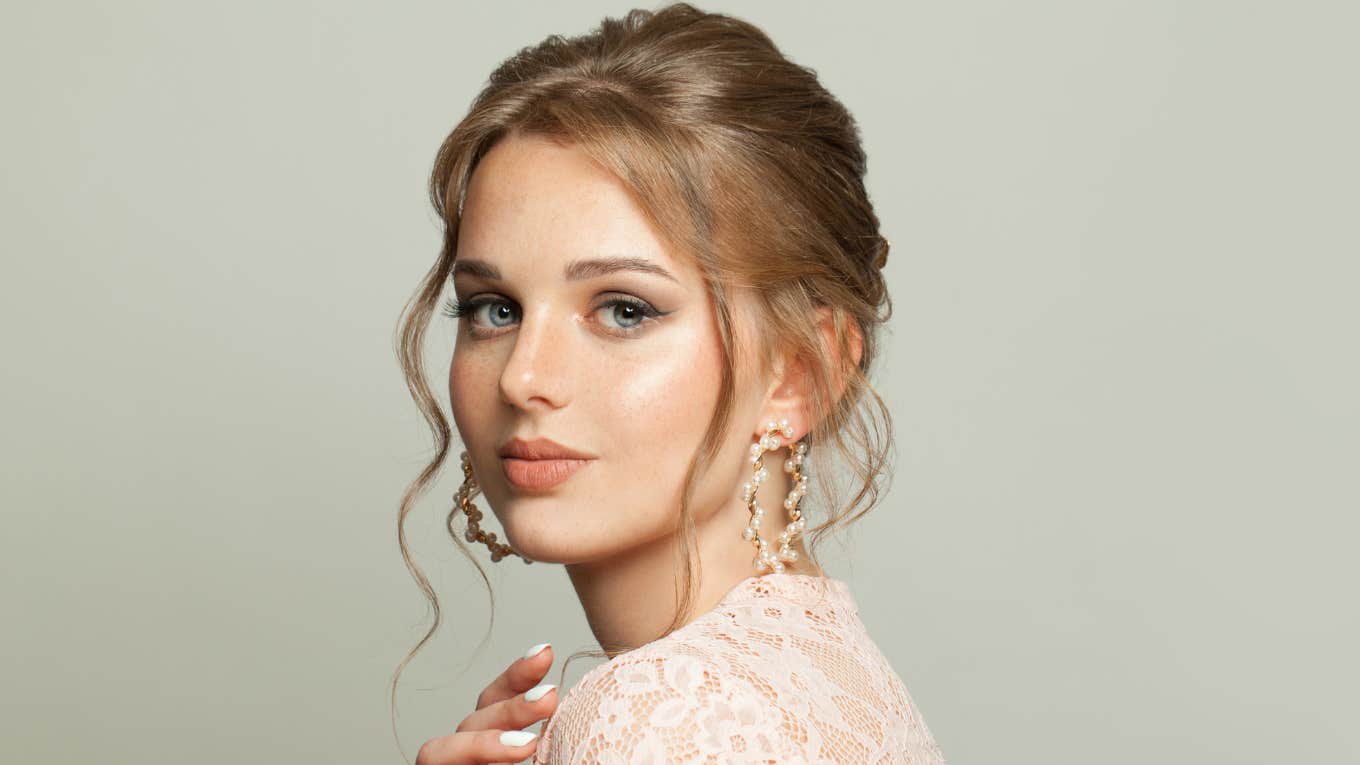I’m A French Model Whose Done Runways And Red Carpets — But This Is The Secret That Saved My Marriage
French modeling legend Ines de la Fressange tells all.
 nemchinowa | Canva
nemchinowa | Canva "I never believed in the goddess thing," says Ines de la Fressange, about her emergence as one of France's legendary beauties. Tall, exquisite, with a perilously delicate frame, the former Chanel supermodel is now a designer and businesswoman, still appearing frequently on television and in magazines.
In 1989, at the height of her modeling career, she was chosen as Marianne, the symbol of the French republic, a role in which Brigitte Bardot and Catherine Deneuve preceded her. "Actresses and models often can't have a balanced emotional life," she says.
"When you're sitting in front of a mirror all day, you unavoidably become a little egocentric and also a bit fragile. I was brought up to respect creativity more than anything else. Being a model is everything but creative. While I worked very hard, I wasn't under the impression that I was doing much. It was as if I were going to the casino and winning all the time."
I’m a French model who's done runways and red carpets — but this is the secret that saved my marriage
That attitude served her well. Parisians have followed "Ines" through her triumphs and setbacks with affectionate pride — she is known for being infinitely sympathique, natural, and accessible — despite their distrust of anyone with her aristocratic origins.
She left the runway in 1990 after a falling-out with Chanel's Karl Lagerfeld, who allegedly was unhappy that his muse had taken the vulgar role of a national icon, and perhaps annoyed that there was someone new at the center of her life: Luigi d'Urso, the man who would become her husband.
 Jaguar PS / Shutterstock
Jaguar PS / Shutterstock
Ines went on to create her own line of clothing, jewelry, and decorative objects for the home, though she had to fight a legal battle to regain control of her own name after the company she designed for expropriated it. Today, as president of Roger Vivier, she is helping designer Bruno Frisoni revive the legendary footwear label, purchased in 2000 by Tod's Group. (Vivier, known as the inventor of the stiletto, made extravagant, sculpted shoes worn by fans ranging from Queen Elizabeth II to John Lennon.)
And Ines's floppy "Bobo" (bourgeois bohemian) dolls — mom, dad, and kids — based on sketches she did for her two young daughters, have been a hit in Paris department stores. Their style, she says, is "a step away from the cliché 1950s family." Ines, too, is a mix of the bohemian and the traditional in the way she attempts to balance work, family, and time for herself.
"You have to be very careful and try to keep an element of lightness and frivolity in your life," she says in a husky voice, lighting a cigarette. "When you take care of yourself, you take better care of your children and husband.
At the beginning of the school year, I always promise myself that I'll go to the hammam [Turkish bath] or take an afternoon off to go shopping, and then I never really do. Women always feel guilty because we're either at work or buying gym shoes for the children or light bulbs for the house so that when we're finally in a department store in the lip-gloss section we buy something very quickly as if we were doing something bad."
Extremely conscientious about the amount of time she spends with her daughters, Ines is also sensitive to the fact that her husband requires attention as well. "Fathers will play with their children for a couple of hours while we're making an appointment at the pediatrician's, filling out the school form, writing a check for the class trip, and taking care of things in general nonstop."
But there's no justice where a couple is concerned, she says ruefully, and it's no use trying to keep checks and balances. "We have to accept this [inequality], even if it seems incredibly appalling given one's socio-politico-professional life. You can be the most liberated of feminists, a politically committed woman, and still not succeed in your sentimental life if you're not able to turn a bit of a blind eye."
Girlfriends are of utmost importance, she adds. Talking about men together, voicing problems and concerns, helps her see that certain things aren't so serious after all.
"My friends don't say, ‘Oh, my God, Ines is going to get divorced.' They can simply listen, discuss, and compare. To sum it up, one has to have a bit of a geisha quality, a feminine side in the traditional sense, like our grandmothers and great-grandmothers.
"When women have children, she says, they often end up pushing their men away. "There's this danger of becoming everyone's mother — even your husband's! And there is always a point when husbands resent us for being our children's mothers. It's important to leave the children a little, and be available for your husband."
Ines's marriage survived a great source of stress for many couples: fertility problems. "I had terrible trouble conceiving, and this is often very dangerous for a couple because it's almost unavoidable that the woman becomes obsessive because fertility treatments are so all-consuming." Whenever possible, she dealt with the treatments on her own.
 nimito / Shutterstock6
nimito / Shutterstock6
"For Luigi, all the medical procedures were a huge deal. I never asked him to come to the hospital with me. I often saw couples there waiting for hours on end because they were doing things together, and I couldn't help thinking that they were taking a tremendous risk."
She and d'Urso met when she was 18; she attended his first wedding and ended up marrying him in 1990, years after he had divorced. In between, she had "many different love stories."
It is only after you've lived through different stages in your life and loves that you can have a real notion of what a couple is, Ines believes now. "If I had stayed with the guitar player who was in my life when I was 15, we wouldn't have a lot to say to each other today. There's a sort of evolution in one's love life. The proof is that when I met Luigi at 18, I couldn't imagine for one second falling in love with him.
At the time, I wanted a guy to be brilliant, funnier than the others, and talk more loudly than anyone else. And what I found seductive in Luigi when I was 30 — he talked to me about India and the Indians' vision of the world and how they weren't individualistic — wasn't at all what would have interested me at 18."
"I think people get married too quickly and divorce too quickly," she says. "I've often noticed that women blame their husbands for the very things that attracted them in the first place.
They'll say, ‘He's too poetic, too intellectual, incapable of facing his past, which he's dragging behind him.' Lots of women are waiting for Prince Charming, and that's a mistake.
I don't think all the clichés like meeting your lover on the platform of a train station, and so on, have much to do with the couple on a day-to-day basis. I think one has the right to hate one's husband on Friday and adore him on Saturday. It's this paradoxical side to life that we just haven't learned — there are ups and downs."
Alex Alexander is a pseudonym. The author of this article is known to YourTango but is choosing to remain anonymous.

